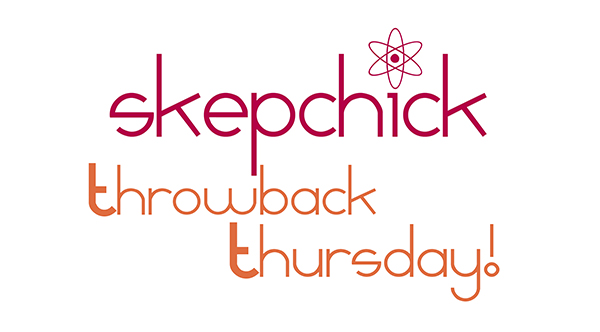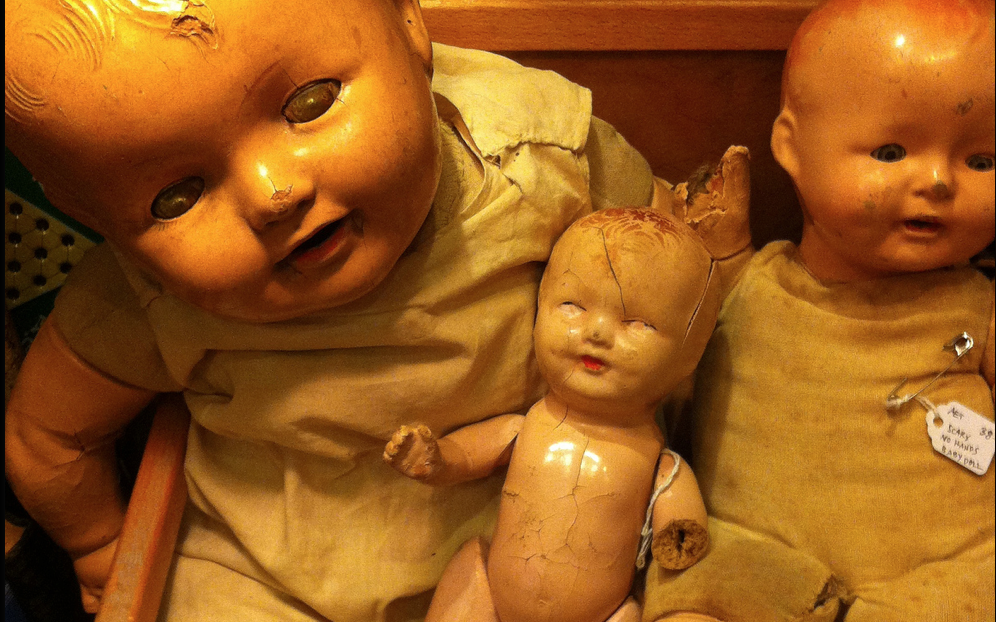Afternoon Inquisition
AI: Free Books!
Today’s the day when Kirk and Ray are handing out destroyed versions of Origin of Species!
If you had the chance and resources to hand out any one book to college kids around the world, what book would you choose?
The Afternoon Inquisition (or AI) is a question posed to you, the Skepchick community. Look for it to appear daily at 3pm ET.





Death From the Skies because there is astronomy, science, and fun all in one package. And I love astronomy, science, and fun.
Carl Sagan’s Demon-Haunted World would probably do the most good, although I fear we would need something a little shorter and more accessible to hook your average person, or even your average college student.
Roger Zelazny’s _Doorways in the Sand_ because it’s about the most fun I’ve ever had reading a book. It begins on a college campus at least.
1st choice Demon-Haunted World – 2nd choice Evolution: The Triumph of an Idea by Carl Zimmer.
Off the top of my head, Demon-Haunted World would be my first choice. If only because I’m re-reading it right now.
“Flim-Flam!”
I’m looking forward to the new Randi book, I’m sure that it’ll be worthy of handing out. On a related note, I have donated many copies of Origin of Species, through Donors Choose, and through local book drives. It’s shocking to find that some school districts will not pay for them. I understand having tight budgets, but I’m sure they draw line at Darwin for a reason.
The last book I actually donated to a library was “Little Brother”, by Cory Doctorow.
But there are so many good books… and the stuff that appeals to one group might not appeal to another. “Death by Black Hole” might be a good choice.
What book would I hand out?
Dennis Reynolds: An Erotic Life
The Hitch-Hikers Guide to the Galaxy by the Late, Great Douglas Adams.
Things can get so serious at college, you need to remember how to laugh. And “Don’t Panic” is probably the best advice for anyone in any situation.
Plus, I like that Douglas Adams essentially invented the iphone in 1978.
The D&D Player’s Handbook?
Or maybe, to stay more in the spirit of this, The Greatest Show on Earth by Dawkins? I’m reading it right now and it’s pretty good.
I’d hand out Demon Haunted World also.
Richard Dawkin’s “The Selfish Gene”.
“Watership Down.” I just… It’s a really good book.
Honestly? The Manga Guide to Statistics (which is awesome). If more people understood how to actually use and interpret statistics, it might deflate a lot of the silly-ass arguments of everyone from ID-ers to anti-vaxxers.
Also, understanding statistics is kind of a critical-thinking course in disguise.
The God Delusion by Richard Dawkins
Mark Twain’s ‘The damned human race’ a nice collection with his twisted vent on humanity.
Then anything by R.P. Feynman, he kinda tickles my funnybone.
autotroph @15:
A significant portion of the population of the US can not even make change of a dollar and you expect them to understand statistics?
@Expatria: LOL.
Since someone already nominated The Hitchhiker’s Guide (darn it) – and to not go with a very predictable choice – I’d go “The Tao Of Pooh.” A fairly calm and relaxing book, an interesting perspective on Pooh, and an interesting perspective on philosophy.
How to Think About Weird Things: Critical Thinking for A New Age, by Theodore Schick and Lewis Vaughn
@Aaron
I agree. Watership Down is a great book. It has a more serious and realistic portrayal of the animals, despite them being anthropomorphic. One would think a book about bunnies would be cute, but nope.
Good Omens, by Pratchett and Gaiman. A great introduction to _two_ writers who, to me at least, encourage thinking in an often funny and non-threatening way.
An IKEA catalog?
@Gabrielbrawley: I’d hand out Demon Haunted World also.
Damn. I would have sworn it would be “bOObs: A Guide to Your Girls”. I just lost 20 bucks.
@autotroph: Good choice!
Hitchiker’s, as someone said. I’d say the Illuminatus! trilogy by Robert Anton Wilson, but I think it would go over a lot of kid’s heads.
Herman Hesse’s Siddartha is a book I really enjoyed.
A Bible with a 50-page introduction about how reading this literally has caused untold torture and death, wars and exterminations, The Brady Bunch, and other horrors on the face of the planet. While science may have eugenics, they also have vaccines, space travel, and nuclear power.
@infinitemonkey: COTW!
Although they have both already been said, “Demon Haunted World” and “God Delusion” would be my top two choices.
The Skeptics Annotated Bible. ‘Course it would need to be published first.
“infinitemonkey,” who would you have write the 50-page introduction?
I’d have everyone read “Frankenstein” to teach them not to just believe everything they see in the world (really, the Frankenstein in the book is so much better and more interesting than Hollywood’s version) with follow up reading being “The Man Who Mistook His Wife for a Hat” by Oliver Sacks to teach them how limitless the mind is.
The Social Contract. Rousseau
The Age of Reason. Paine
The Wealth of Nations. Smith
Das Kaptial. Marx
Beyond Good & Evil. Nietzsche
The Geneology of Morality. Nietzsche
State & Revolution. Lenin
My Life. Trotsky
State Capitalism in Russia. Cliff
Why I write. Orwell
Homage to Catalonia. Orwell
Logik der Forschung. Popper (The book where falsifiability as the core of science was first outlined)
Relativity. Einstein
Six easy/not so easy pieces. Feynman
Everything and More. Wallace
Galileo’s Finger. Atkins
The Road to Reality. Penrose
The Science of Uncertainty. Rosenthal
But to be honest I think either of the last three plus Logik der Forschung would be sufficient.
Six -Easy Pieces – Richard Feynman
Oh and of course “Terror and Virtue” by Robspierre and “Violence” by zizek
Damn, they’re not handing any out in Wyoming. I was looking forward to reading some comedy this weekend.
I’d definitely hand out my favorite little yellow handbook, Principia Discordia. Everyone should read it at least one. Then put it in their bookcase. Then dust it off and read it again 18 months later to fully understand it.
I would go with Hitchhiker. I read it in college and was a new type of reading for me and genre of humor.
I t may not change their life, but will make them laugh
@davew: Sorry. I promise more boob comments in the future.
Anne Lamott’s Bird by Bird. Best book on writing I’ve ever read.
A primer on language use and proper diction.
@madfishmonger: I’d say the Illuminatus! trilogy by Robert Anton Wilson, but I think it would go over a lot of kid’s heads.
I like your way of thinking. I’m afraid that the Truth in the Illuminatus! would be too much for most impressionable minds to handle though. ;)
Shit! I thought that it was happening tomorrow?!?!?!
I’m gonna run up to NYU and see if I can snag a copy!!!
Damn!
The Demon-Haunted World, of course. Also, Shakespeare’s four great tragedies: Hamlet, Macbeth, Othello, and King Lear.
I got a copy!!! Someone left a copy of it inside a starbucks on the window sill. I stopped short outside, went into the store and asked the girl who was sitting next to it where she got it and she said it wasn’t hers and that someone must have left it there. Wonder why? *snark* oh joy!
Bad Science is accessible enough to stand a chance of being read. Quite witty too.
It would take a book question to bring me out of lurkdom and actually register to post….
Anyway, I’m with Bjornar on this one – Good Omens. But mostly because it is my very favoritest book, and I try to shove it people’s hands and get them to read it all the time anyway.
@James Fox:
Complete with a map showing them the best routes for exiting your lawn?
Yet another vote for Demon Haunted World. Sagan just had a way with words that makes him easy to read and understand, and this book lays a great foundation for the critical thinking skills that so many college kids need.
@infinitemonkey, I doubt the Bible would really need a 50 page introduction explaining how bad it is. I second Hitchhiker’s. It’s actually what set me on the road to godlessness, what with Adams’s enthusiastic atheism, and his many personal writings about reading the selfish gene and befriending Dawkins.
I recently read “Julian, a novel”, by Gore Vidal.As an atheist and a lover of history(especially ancient history), I greatly appreciated this book. I suspect many of our most prominent representatives (Hitchens in particular) have read the novel, as some of the arguments I have heard them use sound vaguely similar to the ones I read within its pages (that were written in 1964, if I am not mistaken).
Kama Sutra or Sex for Dummies.
I don’t know that I’d necessarily hand out any book to college students… the value of anything one gets for free is immediately diminished, and in the eyes of a college student doubly so. (Unless it’s food or a t-shirt, then there’s a fight to the death.) And turning any book into something that makes it look like it might be more homework tends to make it into a distasteful chore rather than anything of interest. (No, I’m not cynical about my classmates, never.) Perhaps it would depend on the venue in which the books were being given: on the quad it looks like you’re trying to sell me something and I don’t want it or throw it away (gasp!). In the bookstore down the street (not the college store), however, I’ve already demonstrated interest and that I am more likely to squee over a free book. To actually answer the question, though…given the resources, I’d like to cop out and offer a selection of titles, mainly chosen from the above listed.
@ChaoSkeptic: Your Principia is yellow?
H2G2, as everyone as already said, but I’d like to also give a usefull book.
101 Ramen recipes. it’s possibly the best cookbook I have ever owned.
Does it have to be a book that is extant? Otherwise there’s a temptation to say something like the “Arithmetica” of Diophantus but not missing any volumes. Sure, no one will care, but then the missing volumes will be accessible. I’d rather do something like that which unambiguously increases our knowledge level than give a book out that is likely not going to be read. Also, if I do this correctly I might be able to win Randi’s million dollar prize.
(And yes I know I’m ignoring a clear implicit rule)
Lots of great stuff, but I’d have to go with _Slaughterhouse Five_ or _The Old Man and The Sea_.
“Everybody Poops”
@Elyse: Something like that, but just a little sarcasm really. What’s sad is how few college students I’ve met who would be interested in reading any of the great suggestions that have been made so far. I don’t think that many college students read a lot for pleasure or personal interest, but I could be wrong.
How to Solve It by George Polya. Oldie but bestie. I collect every cheap copy I come across just to give to bright friends.
I forgot my copy at Starbucks and somebody took it :(
(kidding)
How about “critical thinking for dummies”?
It doesn’t exist yet, but it should.
Other than that, there’s been some great suggestions, but as some people said, if you want college students to actually read it, you need a book that’s accessible, entertaining, short and still carries as much of the right message as possible. That’s a pretty tall order …
@Exarch: Finders keepers :) But think about it this way: I have saved you from a bad case of Head-Desk Syndrome.
I vote for “The Demon-Haunted World,” too. Also, “Evolution: What the Fossils Say and Why It Matters” and “The V Book.”
Innumeracy: Mathematical Illiteracy and its Consequences by John Allen Paulos.
Kirk and Ray will not acknowledge evolution of any kind. They heard claims that Hogans Heroes evolved from Stalag 17. They insisted this was untrue; it was intelligent design because no one could demonstrate the missing Klink.
“The Butterfly Kid” by Chester Anderson. ‘Cuz giant blue lobsters are Teh Awesome.
@JOHNEA13
Groan. ;-)
@JOHNEA13: wow, just… wow.
Yes Means Yes. It’s a message most of them will need to hear during this time period and it’s written in such a way that it may get through better than the “rape is bad” lectures they normally get.
“What Would Buffy Do?: The Vampire Slayer as Spiritual Guide” by Jana Reiss
Everyone should know how to stop an (other) apocalypse.
@shamrock: Totally with you on the Vonnegut. College was the time I started reading his books voraciously, and they really made an impact. I might start them off with “Breakfast of Champions” first, tho.
I am currently re-reading the H2G2 “trilogy” and am thoroughly enjoying it, so that would probably be my second choice.
A few others:
“The Adventures of Kavalier and Klay” – Michael Chabon
A book of short stories by T. C. Boyle
“Childhoods End” – Arthur C. Clark
“Foundation” – Isaac Asimov
I’ll stop there, but I could go on for hours.
@noastronomer:
Isn’t that essentially what Asimov’s guides to the New and Old Testament were? A Skeptic’s guide to the Bible?
“A People’s History of the the United States”, Howard Zinn. I’ve met very few college graduates who questioned why things are the way they are, even among the social sciences. Zinn focuses not on the parade of rich white men who dominate the history books, but underdogs and people’s movements.
@Spidergrackle: I loved that book.
I’d give them Reader’s Digest New Fix-It-Yourself Manual: How to Repair, Clean, and Maintain Anything and Everything In and Around Your Home . IMX, most college students have no idea how to rewire a lamp or clean post-binge vomitus off the couch.
Alternately, I second Hitchhiker’s Guide. Given with a towel.
@james fox
actually, my husband and I both read several of the suggested books in college, whenever we had a friend who mentioned one. the whole point in going to college is to gain knowledge. and a few of those books were critical in making us both into the wonderful skeptics we are today. really, college kids just need to be told the book is good by someone they respect, and they’ll grab it up in no time.
Almost fifthed (like seconded, but more) the HHGTTG too, but I’d have to recommend Salmon of Doubt. Tons of Douglas Adams short stories, several of which deal with his atheism. The puddle parable. Richard Dawkins’ eulogy. etc.
Read it.
Sure, skeptical books are critical. And Demon Haunted World is so old-school that it’s comforting.
But I’d leave them with FlatLand.
Somebody already said “Slaughterhouse Five” so I’ll go with “Fahranheit 451”
Twilight?
Just kidding :P. As many good books have already been mentioned, I will go for
Candide by Voltaire, which was one of the first philosophical novel I read, which is why I bring it up. I should read it again.